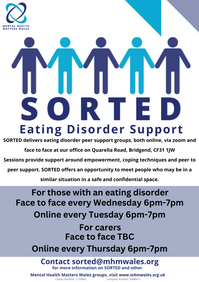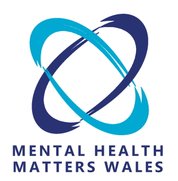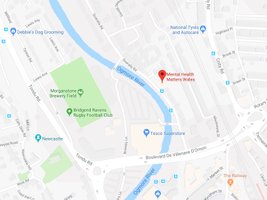Support Us
SORTED
Share Our Recovery Through Eating Disorders
SORTED is our peer 2 peer support to people with all types of eating disorders including their carers, families and friends
SORTED offers an opportunity to meet people who may be in a similar siutation in a safe and confidential space.
Our attendees support each other by sharing experiences, thoughts, successes and problems or by simply listening.
Removing the stimga of talking about Eating Disorders
What is an eating disorder?
An eating disorder is when you have an unhealthy attitude to food, which can can take over your life and male you ill.
It can involve eating too much or too little, or becoming obsessed with your wieght and body shape. There are treatments that can help, and you can recover from an eating disorder.
What causes eating disorders?
The reasons behind what causes an eating disorders are not exactly known, however individuals may experience an eating disorder:
- You or a member of your family has a history of eating disorders, depression, or alcohol or drug addiction.
- You have been criticised for your eating habits, body shape or weight.
- You’re overly concerned with being slim, particularly if you also feel pressure from society or your job - for example, ballet dancers, jockeys, models or athletes.
- You have anxiety, low self-esteem, an obsessive personality, or are a perfectionist (usually a trait of an eating disorder)
- You have had some kind of trauma or event in your life (an eating disorder becomes a way of coping and controlling when you feel you don’t have that in other areas of your life)
- As a form of self-harm, you may use it as a release or distraction from uncomfortable feelings and feel that punishment is a way of dealing with those feelings of shame, guilt and hatred
The most common eating disorders are:
- Anorexia Nervosa
- Bulimia
- Binge Eating Disorder (BED)
- Other specified feeding or eating disorder (OSFED)
Anorexia Nervosa - When you try to keep your wieght as low as possible by not eating enough food, exercising too much, or both
Bulimia - When you sometimes lose control and eat a lot of food in a very short amount of time (binging) and are then deliberately sick, use laxatives), restrict what you eat, or do too much exercise to try to stop yourself gaining weight
Binge eating disorder (BED) - when you regularly lose control of your eating, eat large portions or food all at once until you feel uncomfortable full, and are then often upset or feel guilty.
Other specified feeding or eating disorder (OSFED) - when your symptoms do not exactly match those of anorexia, bulimia or binge eating disorder, but this does not mean it is a less serious illness.
OSFED is said to be the most common, then binge eating disorder and bulimia. Anorexia is said to be the least common.
Symptoms of eating disorder include:
- Spending a lot of time owrrying about your weight and body shape
- Avoiding socialising when you think food will be involved
- eatung very little food
- deliberately making yoursefl sick taking laxatives after you have eaten
- excessive exercising
- having very strict habits or routines around food





